Business is booming for big data markets.
Consider Facebook. It’s usage may have dived in the fourth quarter, but the social media behemoth still pulled in $12.97 billion. Compare that to $8.81 billion in the same quarter a year earlier. Great for business, bad for democracy says Ben Scott, a Senior Advisor for the Open Technology Institute at New America Foundation.
Shareholders are happy, and so are advertisers. Their ads hit targets with laser-like precision based on algorithms measuring your preferences. What you like is offered up on a platter; what you don’t is avoided. Scott refers to this as a “filter bubble.”
Facebook's audience is neatly segmented and isolated based on preference. But what happens when we need to earnestly engage with one another politically, such as during an election? As Scott puts it, what ensues is essentially “Isolated community ‘A’ meet isolated community ‘B’. Discuss!” Leading to fireworks, and not the good kind.
There is real danger ahead, Scott says. As a panelist at the Unrig the System Summit in New Orleans, he points out that in 2016, Facebook had more users in the United States than people who cast a ballot in the United States election. The collection and curation of data which flavored that experience, and left a terrible taste in our mouths, is in stark contrast to his NGO work a decade ago.
“When I was coming up ten years ago, working in an NGO…we were using technology to organize a movement of people to fight for things like net neutrality,” he says. “This was the most important thing that had ever happened to grassroots organizers. We were using data to connect people together who didn’t know about one another to share like-minded ideas, who wanted to work together."
As the volume rises in the argument over big exploitative data markets and the safety of a civil and pragmatic political discourse, Scott highlights three things to remember:
1) Check your filter bubble.
Be aware of how ubiquitous behavior tracking is on the Internet. Everything you type into your browser is collected. Every time you use Facebook, every time you walk somewhere with your phone, it collects a geolocation timestamp. And all of that information is sucked out by the service providers and sold into a massive marketplace so that advertisers can find you, with more messaging that affirms your beliefs.
2) Exercise your options.
These companies make available, almost in every case, options for users to enhance their privacy settings. So use them! You can say no when the app says “Can I have access to all your files and data?” If you do the default reaction of saying “Ya whatever just get the box off my screen,” you might want to check those settings...
3) Don’t jump the gun on drawing your conclusions.
We are at the beginning of this brand new media system. We are going to stumble and fall a few times until we find a policy that works for democracy and for the market. It’s not the end of the world to find that it's not working and it’s causing harm to the integrity of our democracy or come to the conclusion that we are going to implement a regulation (or a few depending on your political affiliation) to change it. Perhaps we will need to tinker with it. And you know what? That’s the exactly what broadcast and cable went through.
An Update On Facebook
In a bid to clean up some of its content over the last several months vis-a-vis filter bubbles and the disinformation debacle, Facebook seemed to have chipped away at its reliable business model. User hours did dive by 50 million in the fourth quarter, however, it still saw that shocking upswing in earnings. Why? Because according to CFO David Wehner, the average price per ad was jacked up by 43 percent. It still analyzed your preferences all the way to the bank.
What’s Next
Scott says to keep an eye on Europe this spring and summer. You’re going to see regulations in lots of different countries at the same time. If Facebook and Google lose in Europe and are forced to make accommodations, then they can no longer argue with Washington that it’s impossible. Once they make a concession in Europe, they could generalize it across their entire platform.
Standby for more on big data v. democracy.
